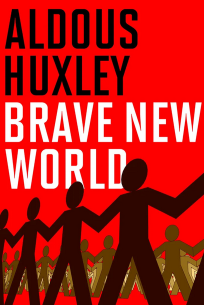The drug-filled dystopia that is Brave New World.

Aldous Huxley’s Brave New World, published in 1932, is a prescient novel about civilization in the year 2540. In the book, he frames his satirical ideas about human happiness via Shakespeare’s comment in The Tempest: “How beauteous mankind is! Oh brave new world, that has such people in it.”
Huxley’s “World State” is one of mass and mindless consumption reinforced by government intervention in the birth process and lifetime behavioral training. In the words of the Director of the London Hatchery and Conditioning Center, the task in his “Fertilizing Room” is to produce standard men and women in uniform batches — “the principle of mass production applied at last to biology.” Further, “We also predestine and condition. We decant our babies as socialized beings.”
Infants are born in womb-like bottles infused with nutrients and chemicals that will determine their place in society’s caste system. Alphas get the best infusions as they gestate; Epsilons are given chemicals that will make them nearly moronic and suited only to scut work. Significantly, Huxley places the darker races in the latter category.
In this world, sexual intercourse is without passion and singularity; sex is promiscuous and as common as a handshake. “Viviparous” births are prohibited and considered an infamy. Women wear belts containing contraceptives to avoid the pregnancy “curse.” (Its abundant references to sex and drugs earn the novel a permanent spot on banned-books lists.)
The Controller of World State, Mustapha Mond, is the only one with access to the knowledge and wisdom of history, which he keeps securely locked in his office vault. In the past, argues Mond, museums were blown up, libraries dismantled, and monuments destroyed in the name of social stability.
In furtherance of that goal, scientists developed the perfect drug, soma, which allows users to “take a holiday from reality whenever you like, and come back without so much as a headache or a mythology.” Citizens simply go to the movies or “feelies” (where they can physically experience the sex they see onscreen). For all the castes, truth is a menace and science a public danger.
Centuries earlier, the visionary Henry Ford — “Our Ford” — wisely shifted humanity away from facts and science to comfort and happiness. Soma is served during coffee breaks in World State, and workers enjoy peaceful afternoons. Emotions are irrelevant.
There is trouble, however, in London. Bernard Marx, an Alpha Director, begins to have strange thoughts not easily drugged away. “What if I were free and not enslaved by my conditioning?” he wonders. What if he experienced passion with a single mate? And what if he could read something that sparked critical thinking? Asking these questions gets him exiled to a humiliating post in Iceland.
Trouble is also brewing on an Indian reservation in the American West. In a prison landscape surrounded by 5,000 kilometers of electrified fence, an exiled child named John, the product of an illicit viviparous romance, comes of age in a tribe living in the old tradition of truth and morality. Because of his unique, non-chemical birth, John is brought to London to be studied as an anthropological specimen.
Derided by his Alpha observers as “the Savage,” John believes life is all about “the refining of consciousness, some enlargement of knowledge.” When he begins to talk about ethics, monogamy, and politics, his sponsors become frightened. Over time, they try to get him to take soma and to participate in conditioning activities. John refuses and finds himself in a place where grief, remorse, compassion, and duty have been subsumed by a vast moral blankness. Exiled to a lighthouse, he lives a solitary life until his whereabouts is discovered and he is relentlessly harassed. In the end, “the Savage” finds the brave new world to be an abomination he can neither change nor tolerate. In despair, he hangs himself.
There are many disturbing parallels to Brave New World today. Instead of soma, we have a troublesome array of opioids and other pharmaceuticals to enhance our moods. Rather than of “feelies,” we have bump-and-grind mass entertainments, easy hookups, and artificial intelligence. Even death itself, ignored as a sanitary nuisance in the book, has lost a great deal of its spiritual significance in our time.
Aldous Huxley was one of the great thinkers of the 20th century. Readers in the 21st have much to learn from him.
John R. Wennersten, an environmental historian, reviews frequently for the Independent.

